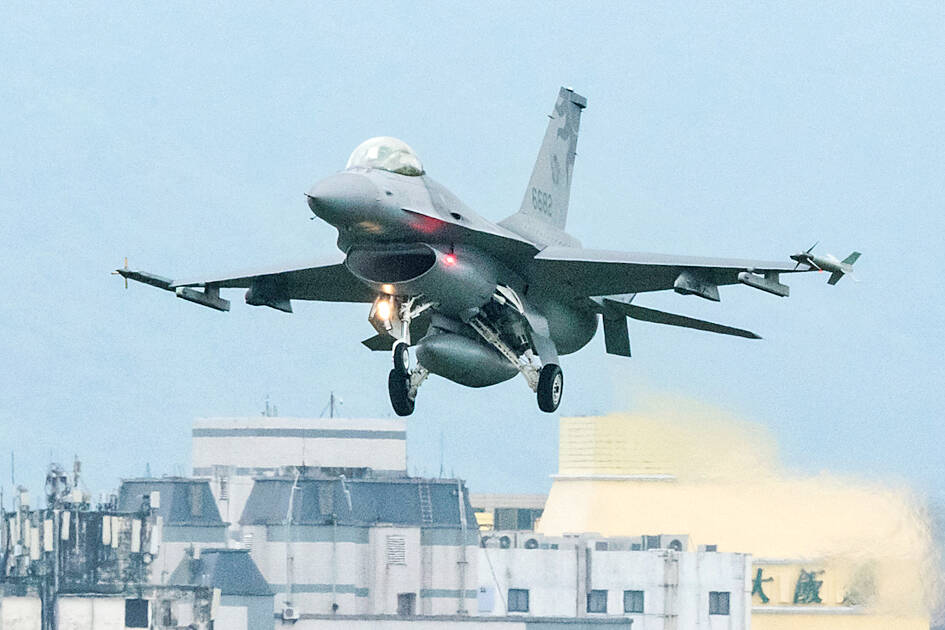The US Department of State has approved two potential sales to Taiwan of F-16 parts and related equipment worth a total of US$300 million, the Pentagon announced on Wednesday.
The deals would represent the 14th arms sale to Taiwan since US President Joe Biden took office in 2021.
In two press releases, the Pentagon’s Defense Security Cooperation Agency said the packages would include standard (US$220 million) and non-standard (US$80 million) spare and repair parts, components, consumables and accessories for F-16 aircraft, as well as other technical and logistics support services.

Photo: Yasuyoshi Chiba, AFP
The proposed sales would “improve [Taiwan’s] ability to meet current and future threats by maintaining the operational readiness of [Taiwan’s] fleet of F-16 aircraft,” the agency said.
They would also help improve the security of the nation and assist in maintaining political stability, military balance and economic progress in the region, it said.
The agency said it had notified the US Congress of the potential sales.
The approval does not indicate that a contract for the equipment has been signed.
The Ministry of National Defense yesterday said that the sales would help maintain Taiwan’s combat capabilities as the Chinese Communist Party continues to suppress Taiwan’s air and maritime training space and response time through “gray zone” tactics, restricting the nation’s right to self defense.
The ministry urged China to cease “all irrational actions” against Taiwan, saying that stability in the Strait requires the joint efforts of both sides.
Asked about Biden’s repeated remarks about defending Taiwan and his administration’s approval of arms sales, Minister of National Defense Wellington Koo (顧立雄) said the remarks show the importance of Taiwan.
The nation needs to enhance its self-defense capabilities, he said.
“Judging from Biden’s past remarks, we can see the importance of Taiwan, as well as that the peace and stability across the Taiwan Strait are indispensable to maintaining global peace and prosperity,” Koo said.
“Taiwan must first bolster its self-defense capabilities and become a force for deterrence by joining the US Indo-Pacific strategy. This is a crucial task of the defense ministry,” he addded.
Meanwhile, the Taiwan-US Defense Industry Symposium opened in Taipei yesterday.
There has been speculation that US defense contractors participating in the forum are to meet with defense ministry officials to talk about details of the arms sales, apart from visiting the Chungshan Institute of Science and Technology and Aerospace Industrial Development Corp (漢翔航空工業).
“The forum is an event for exchange among businesses in the private sector and it has nothing to do with arms sales,” Koo said.
Additional reporting by Shelley Shan

CHAOS: Iranians took to the streets playing celebratory music after reports of Khamenei’s death on Saturday, while mourners also gathered in Tehran yesterday Iranian Supreme Leader Ayatollah Ali Khamenei was killed in a major attack on Iran launched by Israel and the US, throwing the future of the Islamic republic into doubt and raising the risk of regional instability. Iranian state television and the state-run IRNA news agency announced the 86-year-old’s death early yesterday. US President Donald Trump said it gave Iranians their “greatest chance” to “take back” their country. The announcements came after a joint US and Israeli aerial bombardment that targeted Iranian military and governmental sites. Trump said the “heavy and pinpoint bombing” would continue through the week or as long

TRUST: The KMT said it respected the US’ timing and considerations, and hoped it would continue to honor its commitments to helping Taiwan bolster its defenses and deterrence US President Donald Trump is delaying a multibillion-dollar arms sale to Taiwan to ensure his visit to Beijing is successful, a New York Times report said. The weapons sales package has stalled in the US Department of State, the report said, citing US officials it did not identify. The White House has told agencies not to push forward ahead of Trump’s meeting with Chinese President Xi Jinping (習近平), it said. The two last month held a phone call to discuss trade and geopolitical flashpoints ahead of the summit. Xi raised the Taiwan issue and urged the US to handle arms sales to

BIG SPENDERS: Foreign investors bought the most Taiwan equities since 2005, signaling confidence that an AI boom would continue to benefit chipmakers Taiwan Semiconductor Manufacturing Co’s (TSMC, 台積電) market capitalization swelled to US$2 trillion for the first time following a 4.25 percent rally in its American depositary receipts (ADR) overnight, putting the world’s biggest contract chipmaker sixth on the list of the world’s biggest companies by market capitalization, just behind Amazon.com Inc. The site CompaniesMarketcap.com ranked TSMC ahead of Saudi Aramco and Meta Platforms Inc. The Taiwanese company’s ADRs on Tuesday surged to US$385.75 on the New York Stock Exchange, as strong demand for artificial intelligence (AI) applications led to chip supply constraints and boost revenue growth to record-breaking levels. Each TSMC ADR represents

Pro-democracy media tycoon Jimmy Lai’s (黎智英) fraud conviction and prison sentence were yesterday overturned by a Hong Kong court, in a surprise legal decision that comes soon after Lai was jailed for 20 years on a separate national security charge. Judges Jeremy Poon (潘兆初), Anthea Pang (彭寶琴) and Derek Pang (彭偉昌) said in the judgement that they allowed the appeal from Lai, and another defendant in the case, to proceed, as a lower court judge had “erred.” “The Court of Appeal gave them leave to appeal against their conviction, allowed their appeals, quashed the convictions and set aside the sentences,” the judges